137 Search Results for teaching tips
June 28, 2013
by Carole Zangari -
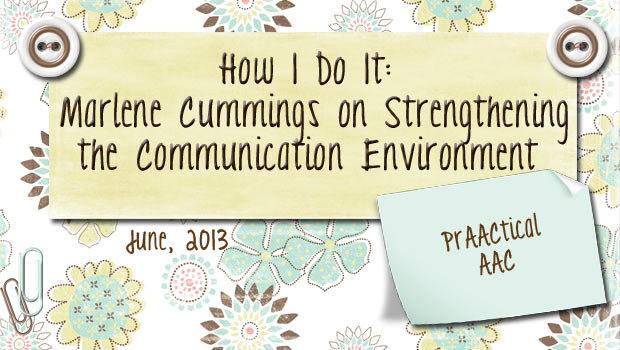
Marlene Cummings is back to share some thoughts on creating communication-friendly environments. As an AAC consultant to the Oakland Schools, Marlene gets to support AAC implementation in a variety of classrooms with all types of learners. You can read her earlier posts here and here. ::::::::::::::::::::::::::::::::::::::::::::::::::::::::::::::::::::::::::::::::::::::::::::::::::::::::::::::::::::::::::::::::::::::::::::::::::::::::: 5 Things to Consider in the “Communication Environment” The first thing we want to ask: Is language being represented visibly? We in AAC are often known by our “stuff”. Because we need to represent language visibly and love technology, we typically have a lot of “stuff”. I, for one, currently have a large storage unit holding 30+ years of “stuff” waiting to be distributed to all my new teams since I am no longer in the classroom. Let’s start by looking around our instructional environment. It is our intention to model the use of language being represented visibly and to provide the vocabulary and opportunities for... [Read More...]
May 23, 2013
by Carole Zangari -
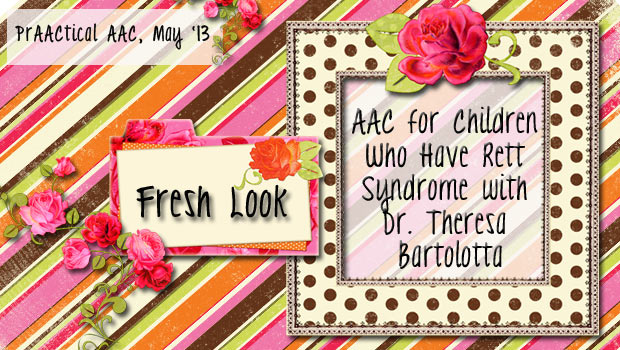
In our SLP training programs, few of us learned about Rett Syndrome or how to provide services to children with that disorder. We’re so pleased to have a guest post on AAC services for children with Rett by Dr. Theresa Bartolotta, Director of Assessment in the Office of the Provost, and Associate Professor in the Department of Speech-Language Pathology, at Seton Hall University, in South Orange, New Jersey. An SLP with over 30 years of clinical experience, she specializes in communication disorders in children with significant disabilities with a special interest in autism and Rett syndrome. Our field is still learning about Rett syndrome and we are still discovering new things about the range of skills and abilities present in the children who have it. In this post, Dr. Bartolotta gives us some background about the syndrome and discusses implications for treatment. I am thrilled to have this opportunity to post... [Read More...]
May 18, 2013
by Carole Zangari -
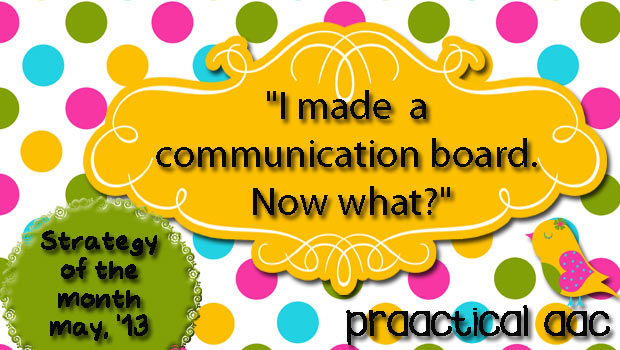
Earlier this month, we shared some ideas for making communication boards using color coding and also for creating boards geared to different communicative purposes. Making the communication board according to some basic principles is a good thing, of course, and it takes a decent amount of thought and planning. Even more important, though, is developing an intervention plan so that the augmentative communicator learns how to use the board effectively. Here are some of our thoughts on how to teach someone to use a new communication board. Model It We’ve talked about aided language input so many times that I’m almost embarrassed to mention it. Almost. The truth is, it is a ‘must do’ strategy when we’re first introducing a communication board, book, SGD, or AAC app. Incidental learning is important for just about all of the people with whom we work. It is never the only strategy we use,... [Read More...]
May 1, 2013
by Carole Zangari -
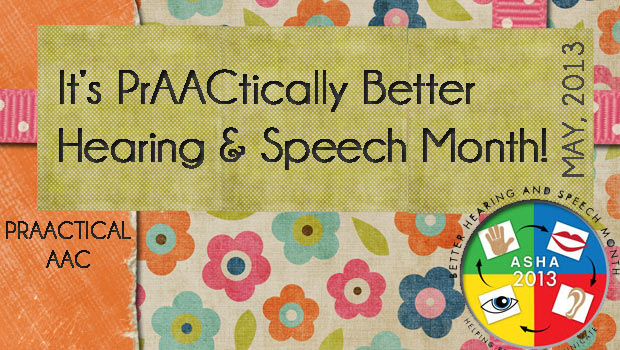
We’re celebrating ASHA’s Better Speech and Hearing Month with a series of posts for SLPs who are working with people who have significant communication difficulties and aren’t currently using AAC strategies. In these posts, we hope to give clinicians a fresh look and some prAACtical ideas about using AAC with a variety of clinical populations. We’ve invited well-respected authors, researchers, and clinicians to contribute to this series. We’re proud to kick-off a new series called Fresh Look with posts on using AAC with children and adults. Watch for posts on on a variety of topics, including: Using AAC to support people with dementia by Dr. Melanie Fried-Oken AAC in General Education with Dr. Joan Bruno Supporting the friendships of children with ASD by Dr. Erinn Fincke Providing initial AAC supports to people with ALS by Lisa Bardach Language therapy with children who use AAC by Drs. Cathy Binger and Jennifer... [Read More...]
March 23, 2013
by Robin Parker -
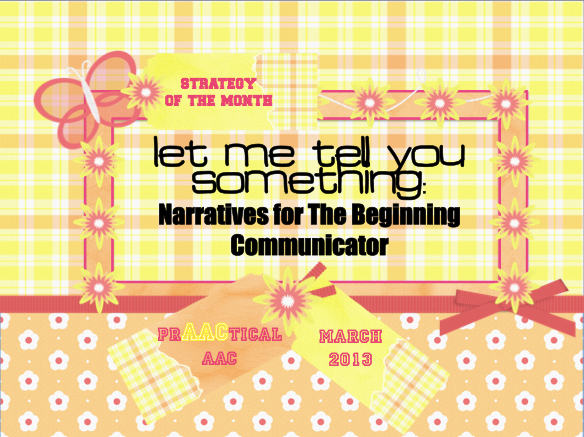
March continues with story telling or narratives as the Strategy of the Month. All learners have stories to tell but some may need special teaching to be able to express their stories. Goals for the beginning communicator can and should include narratives. Personal narratives are a good place to begin but any type of narrative can be taught with structure, routines, partner support, prAACtical strategies. Robust communication includes story telling. Yes, beginning communicators need to be able to express wants and needs however, authentic and comprehensive language involves much more. The quicker we start teaching, the quicker beginning communicators (or anyone) can learn. Beginning Communicator Narratives 3 Types (Just some of the options) Remnant Books are a visual and tactile way of telling stories by recording important events. Learners can help choose items from meaningful personal experiences which serve as a reminder of stories to tell. Create routines and visual supports... [Read More...]
February 21, 2013
by Carole Zangari -
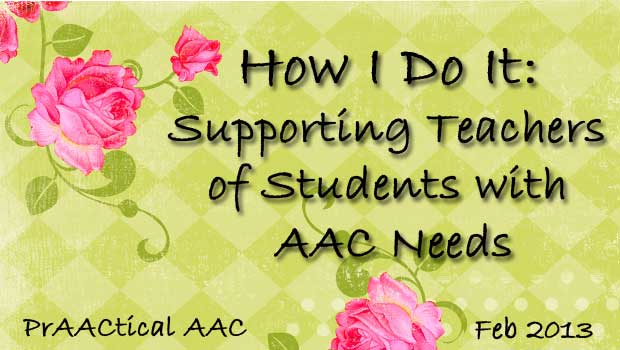
We couldn’t be happier to have a guest post by Jane Farrall for our How I Do It series. Jane has worked as a school and adult service based speech pathologist and literacy teacher. She has also worked as an assistive technology specialist and is currently working as an independent consultant in literacy, AAC and Assistive Technology. Jane has been working in the disability and assistive technology field for over 20 years. She has extensive practical experience in both AAC and in teaching children and adults with disabilities to acquire literacy. She has completed a Masters in Special Education focusing on literacy acquisition in children and adults without speech. Jane is a former Chairperson of AGOSCI (Australian Group on Severe Communication Impairment) and is the founder and organiser of the Big Mouth Camp, a camp for school aged students using speech generating devices and their families. You can get more... [Read More...]
February 9, 2013
by Robin Parker -
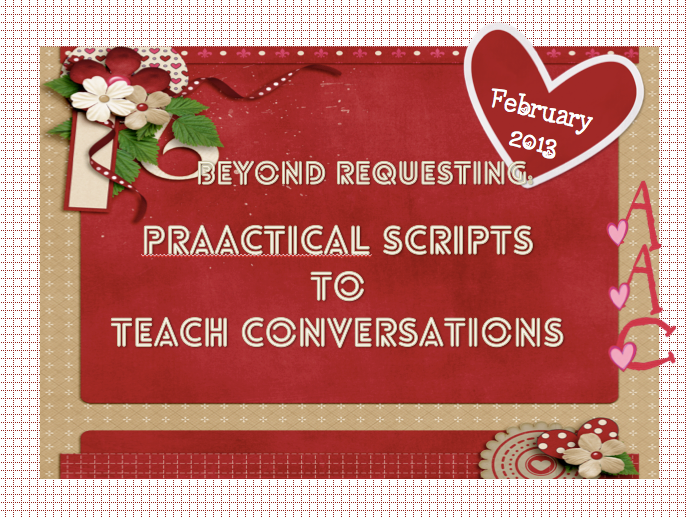
This month’s communication and language strategy goes beyond requesting into conversation. Beginning (and more advanced) communicators can be introduced to conversations through scripts. Scripts for teaching the art of conversation can help give the language to initiate, maintain, extend, and terminate social and conversational exchanges. Scripts can be used to talk about special interests, to participate in activities, and much more. When we teach scripts in a way a learner ‘learns’, the script shows the guidelines, boundaries, and organization of conversations. The communication and language goal is conversation. The strategy to teach conversation is scripts. Scripts are not that foreign to the conversational situation. We all may use scripts at times. Think about your ‘small talk’ scripts or your scripts that help you in unfamiliar or difficult conversations. If learners have difficulty knowing how to participate in conversation, a script can capitalize on strengths like memory and doing well with... [Read More...]
January 31, 2013
by Carole Zangari -
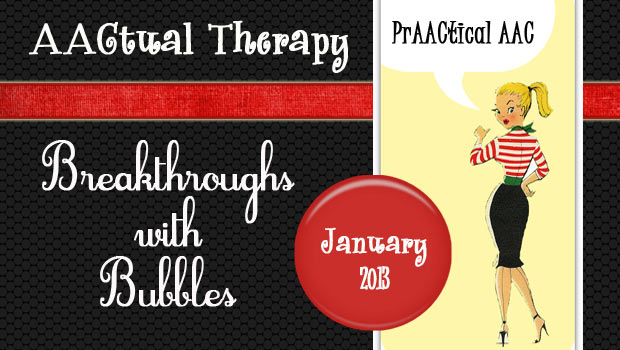
We couldn’t be happier that one of our first AACtual Therapists is Tanna Neufeld, a south Floridian on loan to the Pacific Northwest. Tanna was with us as a graduate student many years ago, and went on to build a fantastic reputation in our community for her excellent clinical skills. It was South Florida’s loss when she left last year and moved across the continent. (I know at least a few people scheming of ways to get her back.) Tanna is now working at the Children’s Therapy Center in Seattle. Tanna blogs at SNEAK Outside the Box and My Blind Side. You can read more about her at the end of this post, in which Tanna talks about using bubbles in her AAC therapy sessions. AAC Breakthroughs with Bubbles! When I first started using core vocabulary boards with my kids, I didn’t really know where to start. It was really... [Read More...]
November 28, 2012
by Carole Zangari -
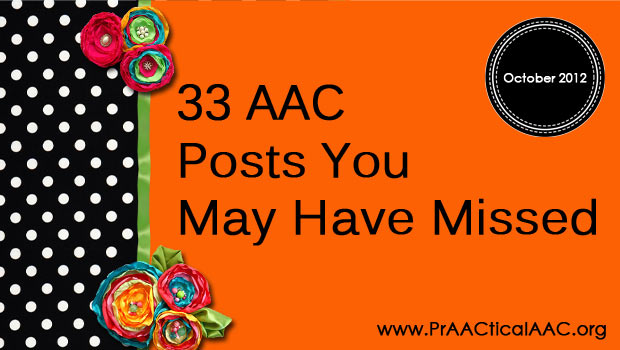
PrAACtical Goals That Matter It’s All About Us Free & Lite Versions of AAC Apps + App Selection Resources Beyond Behavior Problems: How Visual Supports Can Help Our AAC Teaching Fire Safety Week Over, Need to Learn Strategies is Not Watch What You Heat- Fire Safety 3 Communication-Behavior Visual Support Power Tools Simple Start: Visual Supports for Places Around School Ain’t No Stopping Us Now! Video of the Week No Introduction Needed A PrAACtical Look at Getting Started with AAC Symbols Creative Uses of the iPod for Students Who Use AAC Video of the Week: Helping Hands + Visual Supports A PrAACtical Look at the Incredible 5-Point Scale Strategy of the Month Avoiding Insanity: AAC & the Pace of Change Strategy of the Month: Building Acceptance of AAC The Path to Acceptance AAC & Change: Some Thoughts on Influencing Behavior Building Acceptance for AAC: Sharing Information AAC Awareness Month Global... [Read More...]
September 2, 2012
by Robin Parker -
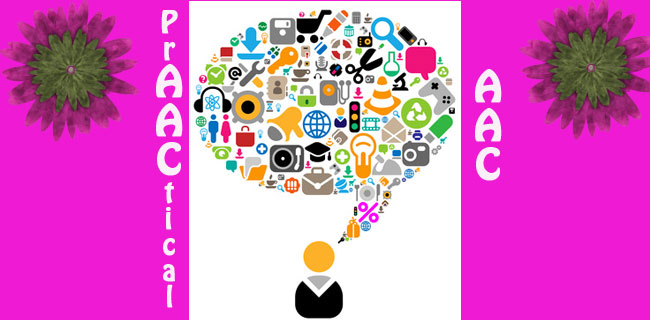
We have recently been surprised (ok, shocked) by the absence of communication supports in educational settings that are supposed to be supporting learners with significant communication challenges. To be even more specific and blunt, the students do not have functional spoken speech. They can’t speak to let you know: what they need, what they don’t need or want, how they feel, what they see, what interests them, what questions they have, what they like and don’t like, when they really reallywant something, etc., etc. etc. And, trust us, they do need to say all of these things. If you work with anyone who does not use spoken speech and we mean ANYONE, they deserve the basic right to communicate with you. Our PrAACtical AAC Absolute A’s: AAC displays need to be accessible ALLOVER. There is no special ‘communication time.’ Communication teaching is ALL the time in authentic situations.... [Read More...]









